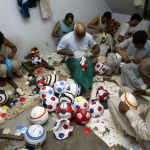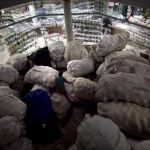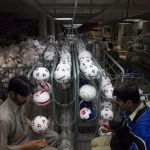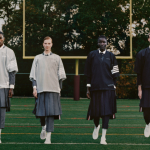
The city of the footballs
If you have kicked a ball it was probably manufacturing in one single city, can you name it?
January 30th, 2018
If you've been playing a football game in the last ten years, there is a 50 percent chance that the ball you were kicking was produced in the exact same city. No matter if you're in Premier League's field, in a Brazilian favela or in New Zealand, about half of the professional soccer balls on the planet - whether they are Nike, adidas or Puma - were produced in exactly the same city. It's called Sialkot, it's in Pakistan in the Punjab region, on the border with Kashmir. About 1.6 million people live in Sialkot, 40000 work in the soccer ball industry and produce between 40 and 65 million a year.
Legitimate question: why football balls are produced in a forgotten Pakistani city?
Russian Ambassador to Pakistan Alexey Dedov has said that his country will be using footballs manufactured in the Pakistani city of Sialkot for use in matches of the 2018 FIFA World Cup. The first recorded occurrence of soccer ball production in the Punjab province was in 1889 when a British army garrison requested that some Pakistani create soccer balls for them. Their request stemmed from impatience; they were growing tired of waiting for soccer balls to arrive via shipment. The big jump happened in the 80s after the political stabilization of the region. The most prominent act on the verge of the history was done by the SAGA sports when they exposed the Sialkot’s sports industry to foreign clients in the 1980s to produce the “Tango Ball” used in the FIFA Football World cup in 1982. This breakthrough opened the ways for other entrepreneurs to work with the global industry. From thereafter, the Sialkot made footballs were considered to be the hallmark of quality and there came a time when the manufacturers were able to send 40 to 65 million balls per year to the customers around the globe. The key to success for the industrial district is clearly the low cost of labor, compared to every other part of the world: just think that an official adidas ball is sold between 100 and 150 euros, and the average salary of a balloon sewer is little more 1000 euros per year (which is twice the average wage in Pakistan). The German weekly Spiegel in a 2010 reported that many suppliers of intermediary companies paid workers every single ball sewn about 50 cents each.

Between China and minor labor
Sialkot's specialization in hand-stitched balls of balloons was the best asset of the Pakistani city, but it also caused a slight crisis in recent years. At the peak of its regime, the industrial district came to produce 70 percent of the world production of soccer balls. Chinese manufacturers are systemically out-competing Sialkoti industry and have wrested roughly a third of the market away from Pakistan. Whereas most Pakistani balls remained hand stitched, relying on the low cost of Pakistani labor, capital saturated China is investing in high tech manufacturing processes.

Soccer balls are a product of profound cultural relevance to much of the world, and Sialkoti manufacturers have been exposed to more intense scrutiny than the producers of almost any other item. In 1996 European journalists exposed the routine employment of children as young as five years old by Sialkoti soccer ball producers. Faced with the threat of its largest clients switching to their competitors the Sialkot Chamber of Commerce signed the Atlanta Agreement with UNICEF and the International Labor Organization in 1997, ensuring that children younger than 15 were never forced to miss school to produce soccer balls.This process repeated itself when Nike pulled out of a seven million-ball contract with SAGA Sports in November 2006 amid rumors of violations of the Atlanta Agreement. Domestic pressure from Sialkoti businesses afraid of losing buyers forced the Pakistani government to draft national policies protecting child laborers and disallowing abusive employment practices. The Pakistani prime minister went so far as to arrange a meeting with CEO of Nike in Davos to persuade him to resume Nike’s business in Sialkot. While child labor remains prevalent in small businesses that produce goods for domestic consumption, labor standards have improved significantly in larger companies that rely on exports, demonstrating the potential power of markets to, for better or worse, impose values. However, parents still send their children to the brickworks and into metalworking companies where no one is worried about corporate image. The local sports companies are aware of what's happened but they want to fulfill the wishes of their Western customers. After all, the people who spend a lot of money on footballs want to do so with a clear conscience. The customer in a sports retail outlet doesn't realize that young girls are now hauling bricks right next door to Danayal, the stitching factory.















